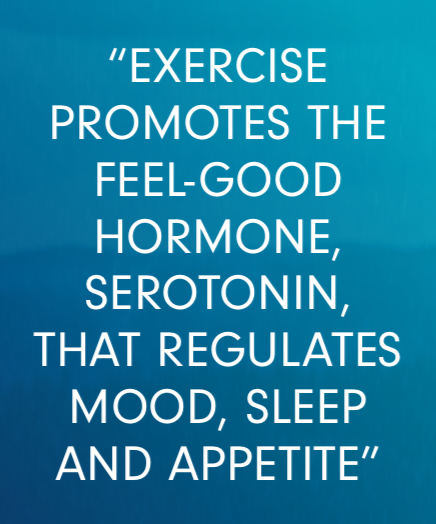Blue Monday
Share
We’re told the third Monday of January is the most depressing day of the year. Here, our experts have provided ways to help you beat not just ‘Blue Monday’, but any down days you might experience…
Reach out to those around you
“When it’s an overcast grey day we may feel gloomy and choose to avoid being sociable,” explains nutritionist Alex Woods. “This avoidance may lead to a spiral of negativity. Whilst experiencing prolonged winters and occasional low mood, reaching out and connecting with a friend can improve it instantly. If this is ‘too much’ then connect via text or email and arrange to call or have them call you.”
Mood foods
“Feed the brain with essential fatty acids to boost your mood,” says wellness expert and fitness author Jacqueline Harvey. “Turkey is high in protein an contains tryptophan, an amino acid that helps boost dopamine and serotonin in the brain. Healthy carbohydrates such as wholegrain foods, also high in fibre, are comforting, but they will also help stabilise blood sugar levels, preventing mood dips and irritability. In the winter a vegetable soup with barley and other wholegrains is a warming mood booster.”
Look after your gut and it will repay you
“Numerous studies in the past two decades have demonstrated links between gut health and the immune system, mood, mental health and endocrine disorders,” says Harvey. “Fermented foods contain high levels of probiotics, which top up the healthy bacteria that naturally live in our intestine. They are known for aiding in digestion, boosting the immune system and cleaning our gut. They’re a key contributor to the health of the gut-brain axis and have a calming effect on the body, specifically helping with aggression. Fermented foods containing probiotics include kefir, sauerkraut, kimchi, pickles and live yoghurt.
Struggling to include kefir into your diet?
If you are struggling to include fermented foods into your everyday diet, then opt for a supplement version. “Look for one that contains glutamine, probiotics, digestive enzymes, prebiotics and essential cofactors as well as very specific ingredients, such as ginger, turmeric and Serrapeptase, to work in synergy protecting the gut from inflammation and boosting gastro-intestinal health,” explains nutritionist Martina Della Vedova. “Take before you go to bed; when your digestion is at rest, you are having a temporary fasting meaning the ingredients in the GI Natural powder can work their magic,” she adds.
Don’t relate to Pathetic Fallacy
“Just like weather, exercise has a big impact on mood and a little exercise goes a long way,” says Woods. “It promotes the feel-good hormone, serotonin, that regulates mood, sleep and appetite. By taking a long leisurely walk or having a short burst of interval training alleviates symptoms associated with depression and anxiety. It’s even more beneficial to exercise outside, even in the rain. Even walking on grey days allows UV exposure and regulates circadian rhythm and mood.”

Beetroot can also leave a smile on your face
Incorporating this super food into your life may be more beneficial than you think. “Beetroot powder is a fantastic source of the chemical betaine anhydrous and the amino acid tryptophan, both of which are shown to improve your mood,” says nutritionist Dimitra Sentelidou. “Betaine is a chemical that occurs naturally in the body, but is also found potently in beets. As well as this in order for your body to manufacture serotonin, the neurotransmitter known as the ‘happiness hormone,’ it needs a sufficient supply of tryptophan.”
Cuddle your pet
Give your pet a cuddle to start the day in a positive way. “There is a great evidence that having a pet boosts overall health by reducing stress, increasing immunity, improving mood, making us more sociable, increasing fitness and staving off heart disease and major mood disorders,” explains Woods.
Harmonise your body and mind
Hemp, the sought-after natural ingredient, continues to hit headlines thanks to its highly nutritious health benefits. Hemp contains phytocannabinoids, “Phytocannabinoids are natural substances found in cannabis sativa plants,” explains Della Vedova. “When we absorb them, they interact with our nervous system, brain and immune system. They do this by mimicking – or helping to increase – the activity of natural chemicals produced in our own body known as endocannabinoids. Endocannabinoids have effects on many systems and processes in our body, including digestion and appetite, mood, stress response, sensations of pleasure and pain, our immune system and reproduction. So, phytocannabinoids from cannabis sativa are thought to have beneficial effects in these areas.”
Keep dry
Struggling
to budge the bulge?
We all know that alcohol is an anti-depressant, so not only will Dry January
help improve your mood, but it could also help budge the extra chub that you
may have added on in the build up to, and over Christmas. “Alcohol stimulates
appetite so you are more likely to over eat,” explains Dr. Sarah Brewer. “It
also affects judgment and willpower so you are less likely to make healthy food
choices. Moreover, it provides ‘empty’ calories that are readily converted into
fat in the body.”















FOLLOW BESTFIT